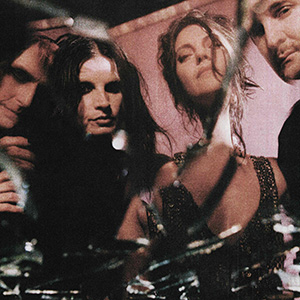
Sharon Van Etten returns for her first proper release since We’ve Been Going About This All Wrong (2022). For the first time, Van Etten wrote the music in collaboration with her band, and the results differ from what we have come to expect. The style is very synth-heavy, and the sonics are sometimes darker and gloomy. Yet, the band still achieve moments of colossal scope. It serves as a nice detour in her body of work, not an experiment necessarily but an exploration into the enchanted parts of her art.
Surprisingly enough, the idea to include her group in the creative process took place as they were rehearsing in the desert for an upcoming tour, and Van Etten encouraged them to jam and take some time to explore together. That had never been Van Etten’s songwriting process, but soon enough, they had written two songs, “I Can’t Imagine (Why You Feel This Way)” and “Southern Life (What It Must Be Like)”, which came to be included on the record.
Those songs tell us much about the band’s state of mind leading up to the recording, as the LP feels nocturnal by nature but contains rare moments of penetrating light. “I Can’t Imagine” benefits from Devra Hoff’s muscular bassline. The track captures nightclub scenes inspired by the Thin White Duke-era David Bowie all the way up through Queens of the Stone Age.
“Southern Light” trembles with echoes from the canyon. Rolling synths, courtesy of keyboardist Teeny Lieberson, are punctuated by Van Etten’s stream of conscious musings: “All my life I closed my eyes / And stumbled in with wayward mind / A stubborn child, but love did have / With one light shining, overlooked.” It’s a rousing song that reaches another level on the back of Van Etten’s vocals.
Sharon Van Etten & The Attachment Theory takes a moment to digest largely due to the 1980s influences that have never been at the forefront of her work. “Live Forever” finds the group applying genuine and manufactured sounds, with Van Etten’s ethereal vocals and Hoff’s serpentine bass held against industrial textures and tones. “Somethin’ Ain’t Right” also achieves New Order qualities with its propulsive bass and Bernard Sumner-style guitar.
The album was produced by Marta Salogni (Björk, Bon Iver, Animal Collective), who is known for her work with synthesizers and electronics, a move that was clearly intentional here. The record was also recorded in London’s the Church, the Eurythmics‘ former studio, which adds another layer of influence. Not surprisingly, the new wave indebted “Idiot Box” begins with a simple structure but builds to a rousing climax that puts synths and Van Etten’s powerhouse vocals front and center.
The sounds aren’t all new wave and goth, however. Some of the tracks are more direct, like “Indio”, which has more in common with female-led indie bands of the 1990s. Trouble and “I Want You Here” sound like quintessential Van Etten and will be appreciated all the more for their simplicity.
As with all of her work, Van Etten seems concerned with deep issues, in this case, the mystery of mortality. The opening sequence touches on prayer, regeneration, and uncertainty, all framed around the central question, “Who wants to live forever?” That is followed by the lead single, “Afterlife”, where she ponders whether we will see our person in life beyond, hoping we will and that they can assure us it will be alright. Like her biggest hits, such as “Seventeen” and “Mistakes”, “Afterlife” contains an immediacy that will resonate with almost any listener.
Even though the record features Van Etten’s striking vocals and cerebral thoughts, it moves with a velocity not experienced in her previous works. Things slow down only slightly in the penultimate track, which is a bit of a letdown. “Fading Beauty creates the ambiance of the desert sun at its zenith, but thankfully, “I Want You Here” swells to a satisfying conclusion.
Van Etten described the freedom she found in letting go of control. That does not mean she is not operating at the height of her powers. A more fluid dynamic exists with the full band, and although nods to certain 1980s styles emerge, Van Etten maintains those aspects of her songcraft that make her a celebrated artist. Thus, in Sharon Van Etten & The Attachment Theory, listeners may feel transported to the depths of a gothic cabaret, but they will eventually emerge to the familiar light of day.

